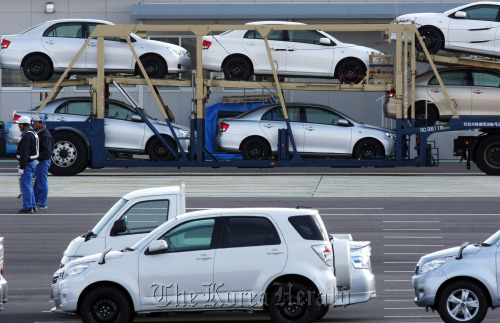 |
Employees work near Toyota Motor Corp. vehicles awaiting shipment at Central Motor Co.’s Miyagi plant in Ohira village, Miyagi prefecture, Japan. (Bloomberg) |
Japan’s industrial production increased more than analysts expected in October as manufacturers boosted output of cars.
Factory output increased 2.4 percent from September, rebounding from a 3.3 percent drop, the trade ministry said in Tokyo Wednesday. The median estimate of 28 economists surveyed by Bloomberg News was for output to increase 1.1 percent.
Manufacturers are contending with a yen near postwar highs against the dollar that has eroded profits and prompted Toyota Motor Corp. President Akio Toyoda to say this month that his company “will collapse” unless the currency weakens. Thailand’s worst flooding in almost 70 years has also caused parts shortages that may force companies to cut output.
“The strong yen in the three months since July has gradually had an effect” on production, Mari Iwashita, chief market economist at SMBC Nikko Securities Inc., said before the report. “Factors such as the Thai floods have reduced overseas demand, but this only affected the second half of October and has yet to be fully factored in.”
Reports in the past week have shown that exports slid in October and the unemployment rate advanced, adding to evidence that growth in the world’s third-largest economy is waning.
Japan stepped into the foreign-exchange market for the third time this year on Oct. 31 to weaken the yen after it reached 75.35 per dollar, its highest since World War II. Finance Minister Jun Azumi said Tuesday there is still volatility in the yen and that he is continuing efforts to keep the currency at appropriate levels.
Flooding in Thailand has damaged the supply chains of Japanese companies operating in the southeast Asian country including Toyota, Pioneer Corp. and Honda Motor Corp. The Cabinet Office said last week that the floods were among risks to the economic outlook.
Toyota lost about 190,000 units of production globally from Oct. 10 through Nov. 19 because of the floods in Thailand, the company said last week. About 30 electrical parts are still in “critical” supply, it said.
The economy grew an annualized 6 percent in the July- September period, expanding for the first time in four quarters. Economists surveyed by Bloomberg News expect that expansion to slow this quarter and moderate further next year. (Bloomberg)
“There’s no doubt that the pace of Japan’s economic growth will keep losing steam because exports are already on a downward trend,” Azusa Kato, an economist at BNP Paribas in Tokyo, said before the report. “Demand from earthquake reconstruction will probably help the economy avert a contraction next fiscal year, but the pace of expansion won’t be impressive at all because of the slowdown overseas.”
The upper house of parliament ratified a third supplementary budget worth 12.1 trillion yen on Nov. 21 to support the recovery from the March catastrophe. Noda said on Nov. 25 that he hasn’t decided whether a fourth stimulus package is needed.
(Bloomberg)








![[Today’s K-pop] Blackpink’s Jennie, Lisa invited to Coachella as solo acts](http://res.heraldm.com/phpwas/restmb_idxmake.php?idx=644&simg=/content/image/2024/11/21/20241121050099_0.jpg)